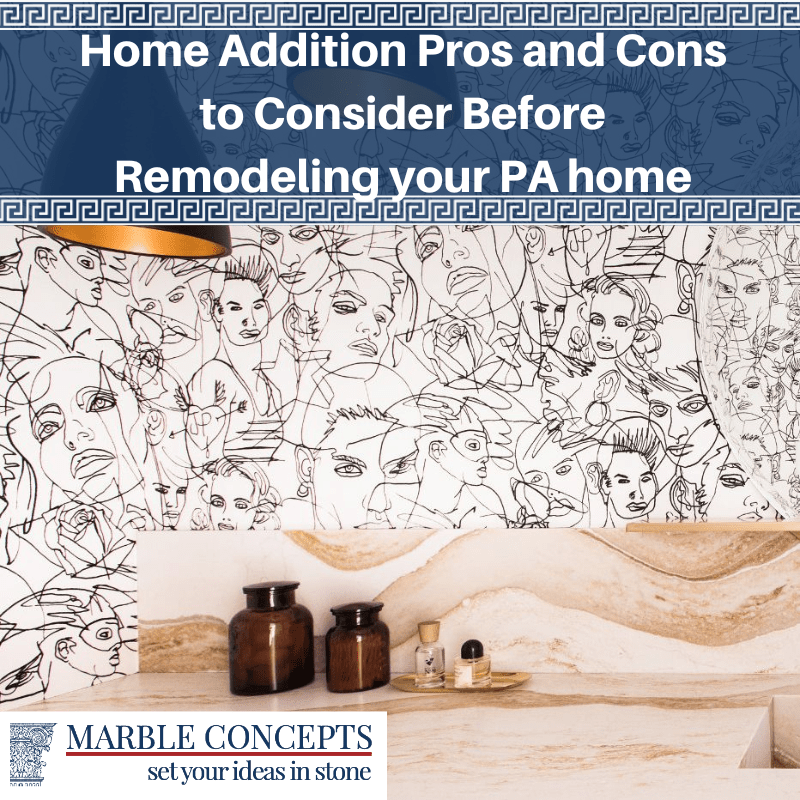Before you set out to make a home addition and remodel, you should understand the pros and cons. This understanding will let you figure out if doing this would make sense. Adding a new structure to the home comes with its benefits, but it has its own risks at the same time. An expansion of the house should agree with your overall vision for the home.
Pro #1: Your Own Creation
In remodeling, you could remodel the kitchen and bathroom or put hardwood floors in the home. Nothing wrong with a remodeling of that type, but you only changed what someone else built with your unique touch. In the future, some new homeowners could change it again. On the other hand, if you choose to put a new addition to your home, you will change its entire appearance.
Few remodeling projects will give you as much satisfaction as envisioning a new addition and creating it. You work with a blank slate and have the opportunity to make a lasting difference in how everyone perceives it.
Pro #2: Great High Cost-Value Ratio
Adding a new addition to the home will cost less than building a new home. In many cases, you recover the cost of the expansion at the time of the sale of the home. Still, we must emphasize that this does assume some risk, but you have a stronger chance that you will recover your costs.
Pro #3: No Need to Move
Let’s say you added a new child to the family, and your home has begun to feel cramped. Buying a new home won’t come at a cheap price. Especially in the real estate market today, the prices keep going up. A new home addition will cost anywhere from $21,000 to $74,000. The average project costs $46,000.
Instead of buying a new home, you can create a new expansion to deal with the lack of space.
Factors that influence the cost of an expansion include:
- Materials
- Labor
- Addition size
- Location
You can also customize the addition to fit your specific needs instead of hoping the housing market will fulfill those demands. Before you begin an addition, check with the city for permits and laws and understand the local regulations.
Pro #4: Control Your Costs
Previously, we highlighted how the average addition costs $46,000. While that might appear like a lot of money, you can control your costs. For example, you can choose to complete the project in stages to make it more affordable and ensure that you remain within budget. This setup lets you take on extra work to make it even better. You could add more expensive components in stages like the crown or trim work.
Con #1: No Guarantee of Cost Recuperation
Unfortunately, you carry some burden of risk if you agree to a home addition. Making an addition to the home won’t guarantee a higher resale price. You can still lose money when you go to sell. Many homeowners who make an addition don’t speak about the extra heating and cooling costs. You can expect this to cost more. You will have more windows to wash, and more gutters to clean and your property taxes will go up because of the addition. All of this will make it less worth it to some people.
This type of project does see a higher return on investment than other remodeling projects, but everything depends on the real estate market when you go to sell it. The people who should be especially aware of this risk are those who plan to sell their homes within the next year or two. Your home value will depend heavily on what the real estate market looks like in those moments.
Con #2: Additions Tax You Emotionally
An addition to a home will tax your emotions because of the risk, the costs, and the potential setbacks. Projects get behind schedule, you wind up with costly mistakes and they can turn into a negative fast. Prepare yourself for this because it can be too much for some people.
Those with rocky marriages should beware because of how this stress can worsen a relationship. Having a work crew in your house six days out of the week, the noise and dust, and constantly dealing with contractors will stress you out at times. Financial worries can make a relationship worse. You want to know about this before you undertake a project like this.
Con #3: More Expensive Than Moving
Depending on the circumstances, a home addition can cost you more than moving to a new home. This even looks at all the fees associated with moving like lawyer fees, moving company costs, and land transfer taxes. You need to spend time thinking about if it will cost less to move. A home addition requires good planning to prevent the costs from soaring beyond the budget. Along with the labor and materials, you will need to pay for the permits and site inspection fees. Failure to get the right permits can cost you tens of thousands of dollars.
Conclusion
At Marble Concepts in Pennsylvania, we have the ability to help you with a remodeling project. We have done business in the area since 1991, and we have helped people to get more value from their homes. If you’d like to learn more, call us at 215-396-7393.






